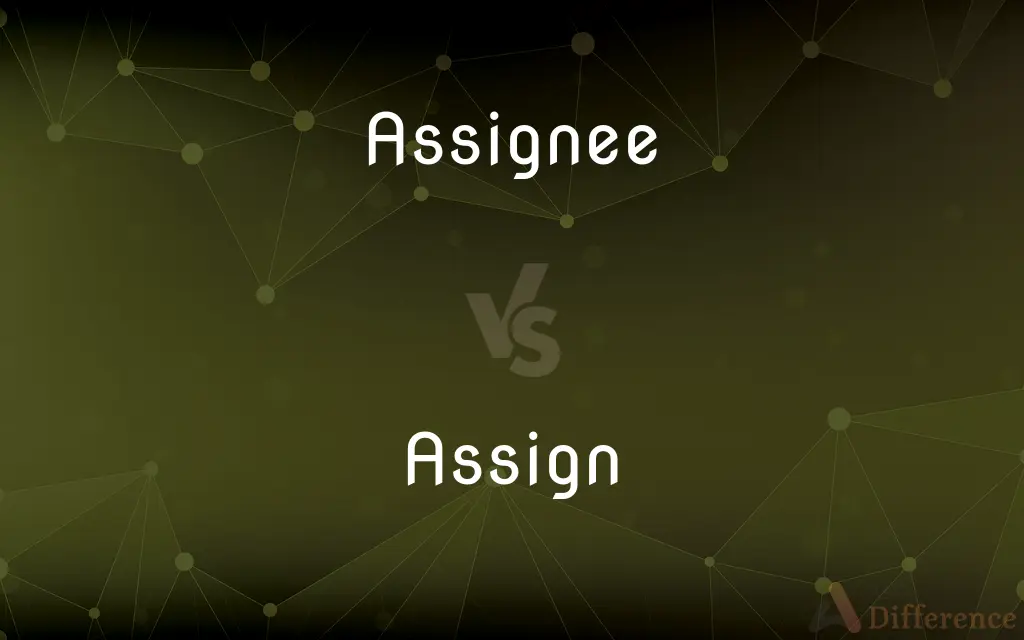Assignee vs. Assign — What's the Difference?
By Tayyaba Rehman & Maham Liaqat — Updated on March 27, 2024
The assignee is the person or entity to whom rights or duties are transferred, while to assign involves the act of transferring those rights or duties to another.

Difference Between Assignee and Assign
Table of Contents
ADVERTISEMENT
Key Differences
The term "assignee" refers to the individual or entity that receives rights, duties, or properties through an assignment. This role is passive, focusing on the reception of the transfer. For example, in a contractual agreement, the assignee is the party that receives the contract's benefits or obligations from another. Conversely, "assign" is a verb that describes the act of transferring these rights, duties, or properties from one party to another. It is an active process, initiated by the assignor, who decides to transfer their responsibilities or privileges to the assignee.
In legal contexts, the assignee often becomes part of a contract or agreement without being an original party, acquiring rights or obligations previously held by another. This transfer is facilitated by the action to assign, which must adhere to certain legal standards and formalities to be valid. Assigning can occur in various scenarios, such as assigning a lease to another tenant or assigning patent rights to a company, underscoring the diversity of situations where these terms are applicable.
While the assignee is typically on the receiving end of the transaction, the process of assigning requires an active decision and action by the original holder of the rights or duties. This distinction underscores the relational dynamics between the assignor, who must choose and enact the assignment, and the assignee, who must accept the transfer. The verb "assign" thus embodies the procedural aspect, including the intention, execution, and sometimes the legal formalization of transferring rights or duties.
The process of assigning and the role of the assignee are integral to the management of contracts, property rights, and various legal obligations. It allows for the flexibility and adaptability of legal and contractual relationships, enabling the original holder to transfer their position to another who may be better suited or more interested in assuming those responsibilities. This can be particularly relevant in business and legal practices, where changing circumstances necessitate the reallocation of resources, rights, or responsibilities.
The distinction between these terms highlights the dynamic nature of legal and contractual relationships, with the action of assigning facilitating the transfer of obligations or benefits, and the assignee being the endpoint of this process. This relationship is fundamental to understanding how rights and duties can be redistributed among parties, whether in business, real estate, intellectual property, or other areas requiring the formal transfer of interests.
ADVERTISEMENT
Comparison Chart
Definition
The recipient of rights or duties.
The act of transferring rights or duties.
Role
Passive, receiving the transfer.
Active, initiating the transfer.
Context
Becomes part of agreements or contracts.
Involves choosing and executing the transfer.
Legal Aspect
Must accept the transfer.
Must adhere to legal standards.
Examples
Receives property rights, contract benefits.
Transfers lease, patent rights.
Compare with Definitions
Assignee
Recipient in a contractual agreement.
The insurance policy's benefits were directed to the named assignee.
Assign
To transfer rights or duties to another.
The company decided to assign the licensing rights to a partner.
Assignee
Beneficiary of transferred obligations.
The assignee accepted the contractual obligations from the original contractor.
Assign
Designate tasks or roles to individuals.
The project manager will assign tasks to team members based on their expertise.
Assignee
Party receiving rights in a will.
The estate's assignee was responsible for fulfilling the will's conditions.
Assign
Direct benefits or penalties to a party.
The court assigned the damages to be paid by the defendant.
Assignee
The person or entity receiving rights or duties.
The assignee of the patent now holds all rights to the invention.
Assign
Allocate resources or positions.
Resources were assigned to the most critical areas of development.
Assignee
Entity to whom property is legally transferred.
As the assignee, she took over the remaining lease term.
Assign
Legally delegate property or responsibilities.
He chose to assign his share of the business to his sibling.
Assignee
A person to whom a right or liability is legally transferred.
Assign
To select for a duty or office; appoint
Firefighters assigned to the city's industrial park.
Assignee
A person appointed to act for another.
Assign
To set apart for a particular purpose or place in a particular category; designate
Assigned the new species to an existing genus.
Assignee
A party to which a transfer of property, rights, or interest is made.
Assign
To give out as a task; allot
Assigned homework to the class.
Assignee
One appointed to act for another; a deputy or agent.
Assign
To ascribe; attribute
Assigned blame for the loss to a lack of good defense.
Assignee
One to whom a thing is assigned.
Assign
To match or pair with
Assign a value to each of the variables.
Assignee
(legal) One to whom a right or property is being transferred.
Assign
(Law) To transfer (property, rights, or interests) from one to another.
Assignee
One who is appointed to act or speak in place of another; an agent.
Assign
An assignee.
Assignee
A person to whom an assignment is made; a person appointed or deputed by another to do some act, perform some business, or enjoy some right, privilege, or property; as, an assignee of a bankrupt. See Assignment (c). An assignee may be by special appointment or deed, or be created by jaw; as an executor.
Assign
(transitive) To designate or set apart (something) for some purpose.
To assign a day for trial
Assignee
(law) the party to whom something is assigned (e.g., someone to whom a right or property is legally transferred)
Assign
(transitive) To appoint or select (someone) for some office.
To assign counsel for a prisoner
Assign
(transitive) To allot or give (something) as a task.
Assign
(transitive) To attribute or sort (something) into categories.
Assign
To transfer (property, a legal right, etc.) from one person to another.
Assign
To give (a value) to a variable.
We assign 100 to x.
Assign
An assignee.
Assign
(obsolete) A thing relating or belonging to something else; an appurtenance.
Assign
(obsolete) An assignment or appointment.
Assign
(obsolete) A design or purpose.
Assign
To appoint; to allot; to apportion; to make over.
In the order I assign to them.
The man who could feel thus was worthy of a better station than that in which his lot had been assigned.
He assigned to his men their several posts.
Assign
To fix, specify, select, or designate; to point out authoritatively or exactly; as, to assign a limit; to assign counsel for a prisoner; to assign a day for trial.
All as the dwarf the way to her assigned.
It is not easy to assign a period more eventful.
Assign
To transfer, or make over to another, esp. to transfer to, and vest in, certain persons, called assignees, for the benefit of creditors.
Assign
To transfer or pass over property to another, whether for the benefit of the assignee or of the assignor's creditors, or in furtherance of some trust.
Assign
A thing pertaining or belonging to something else; an appurtenance.
Six French rapiers and poniards, with their assigns, as girdles, hangers, and so.
Assign
A person to whom property or an interest is transferred; as, a deed to a man and his heirs and assigns.
Assign
Give an assignment to (a person) to a post, or assign a task to (a person)
Assign
Give out or allot;
We were assigned new uniforms
Assign
Attribute or credit to;
We attributed this quotation to Shakespeare
People impute great cleverness to cats
Assign
Select something or someone for a specific purpose;
The teacher assigned him to lead his classmates in the exercise
Assign
Attribute or give;
She put too much emphasis on her the last statement
He put all his efforts into this job
The teacher put an interesting twist to the interpretation of the story
Assign
Make undue claims to having
Assign
Transfer one's right to
Assign
Decide as to where something belongs in a scheme;
The biologist assigned the mushroom to the proper class
Common Curiosities
Is the consent of an assignee always required?
Yes, in most cases, the assignee must agree to accept the rights or duties being transferred to them.
How does assignment affect the original agreement?
The assignment can transfer certain rights or obligations from one party to another, but it typically does not alter the original terms of the agreement unless specifically agreed upon.
Who can be an assignee?
Any person or entity legally capable of receiving and holding rights or duties can be an assignee.
Can anyone assign their rights or duties?
While many rights or duties can be assigned, some are personal in nature and cannot be transferred without consent from the other party involved in the agreement.
What legal considerations are involved in assigning something?
Legal considerations include ensuring the assignment is permitted under the contract or law, the assignee's consent, and sometimes the notification of the assignment to the other original party.
What happens if an assignee refuses the assignment?
If an assignee refuses the assignment, the rights or duties remain with the original holder unless another eligible assignee is found.
What's the difference between an assignee and a delegate?
An assignee receives rights or property, while a delegate is typically given duties or tasks. The distinction often lies in the nature of what is being transferred: rights versus responsibilities.
Can an assignee further assign their rights or duties?
Depending on the terms of the original agreement and applicable laws, an assignee may be able to further assign their rights or duties to another party.
Are there any rights that cannot be assigned?
Yes, rights that are highly personal or where the law or the original agreement expressly prohibits assignment cannot be transferred.
How is the assignment recorded or formalized?
The assignment is often formalized through a written agreement, which may require specific legal formalities to be valid, including signatures and, in some cases, notarization.
Share Your Discovery

Previous Comparison
Dinner vs. Lunch
Next Comparison
Summarise vs. AbridgeAuthor Spotlight
Written by
Tayyaba RehmanTayyaba Rehman is a distinguished writer, currently serving as a primary contributor to askdifference.com. As a researcher in semantics and etymology, Tayyaba's passion for the complexity of languages and their distinctions has found a perfect home on the platform. Tayyaba delves into the intricacies of language, distinguishing between commonly confused words and phrases, thereby providing clarity for readers worldwide.
Co-written by
Maham Liaqat















































